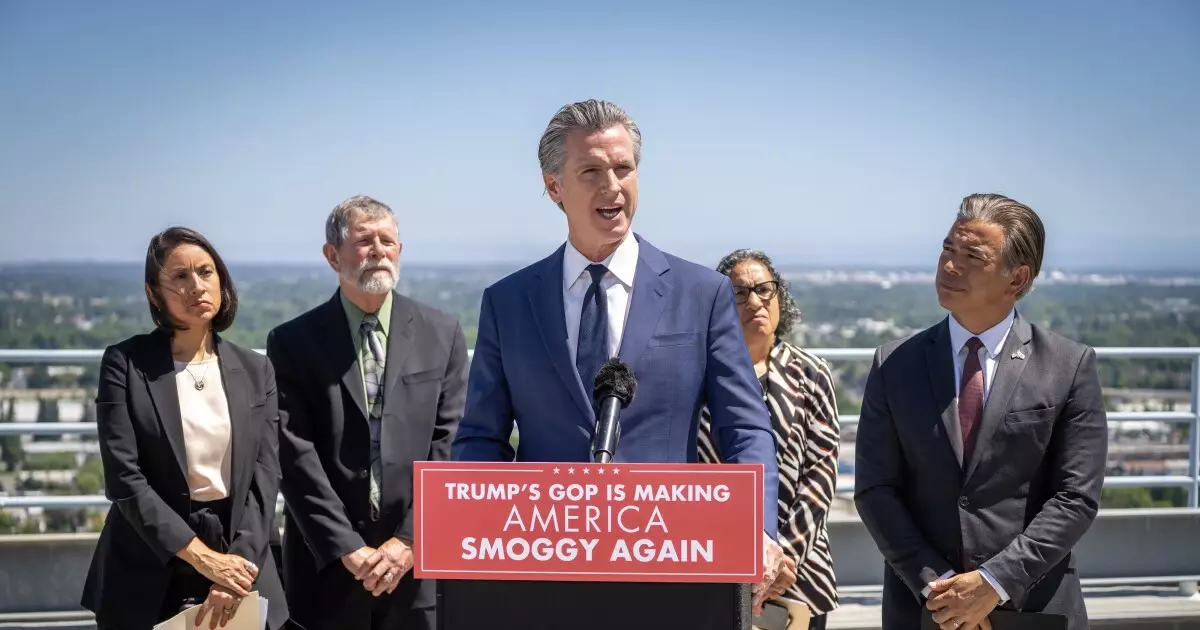The ongoing skirmish between California and the Trump administration over the state’s vehicle emission rules highlights a deep rift in American political ideology. While California officials staunchly defend their right to impose stricter regulations on vehicle emissions, one must question the wisdom of such an entrenched stance given the backdrop of national policy. The recent decision by the Trump administration to challenge these regulations can be seen as not just an infringement on states’ rights, but as a necessary recalibration of the federal regulatory landscape. The decision to overturn these imported regulations is not simply a product of partisan obstinance; it reflects a belief in a balanced approach to economic growth alongside environmental sustainability.
In essence, California’s approach has always been about making grand gestures in the name of climate change, rather than taking practical steps that consider the economic repercussions of their policies. This dilemma raises the question: at what point does the pursuit of stringent environmental regulations compromise economic viability? Striking a balance should be the goal, yet California’s insistence on independence from federal standards often veers into territory that risks alienating critical stakeholders, including average consumers who rely on practical and affordable fuel options.
Historical Precedents and Their Implications
Curiously, Governor Gavin Newsom points to historic precedents where Republican leaders supported stringent environmental laws. What Governor Newsom fails to acknowledge is that the socio-economic context of those eras was vastly different. The political landscape, public sentiment, and technological realities of the 1970s, during Nixon’s presidency, do not mirror today’s complexities. He uses these precedents as both shield and sword, wrapping his arguments in a cloak of nostalgia while neglecting the need for adaptive policies that reflect current realities.
When former Republican presidents championed environmental reforms, the United States wasn’t grappling with the economic implications of an expanding global marketplace and the emergence of contenders like China. A growing call for self-reliance on energy and manufacturing must be part of any rational discussion on emissions — a narrative often sidestepped in the spirited defense of California’s regulatory framework.
Legal Battles and Their True Costs
California Attorney General Rob Bonta’s prediction of a lawsuit against the Trump administration serves as a testament to the state’s willingness to engage in seemingly endless legal battles rather than practical dialogues. But at what cost does this legal posturing come? Continuously litigating against the federal government creates a weary cycle of fiscal waste and distracts from more pressing issues, like infrastructure and sustainable technology investments. It becomes evident that the state uses these headlines to solidify its image without genuinely considering the repercussions for the average Californian.
This serves as a classic example of ‘politics over policy’; the fight becomes one of perspectives rather than genuine attempts at collaborative environmental stewardship. As California’s leadership continues this combative posture, it fails to recognize that a healthy environment and a buoyant economy can coexist.
California’s Reputation and the Path Forward
Amid announcements that positions California in a leadership role for emissions, it’s critical to reflect on a sobering reality: the state still grapples with some of the most dangerous air pollution levels in the country. The disconnect between policy aspirations and actual air quality improvement raises skepticism about California’s environmental crown. With cities like Los Angeles and San Francisco failing to achieve optimal air quality, one must question the rationality behind stringent legislative ambitions when practical solutions could yield more immediate benefits.
It’s commendable that California has made strides in reducing greenhouse gas emissions; however, it’s essential to contextualize these achievements within the broader framework of economic opportunity and public health. A community’s well-being is contingent not only on clean air but also on affordable living conditions and job security. This complexity is ignored in the overwhelmingly progressive narrative that California spins around its environmental efforts.
Whose Interests Are Served?
Ultimately, as California battles against the Trump administration, the narrative falls into dangerous territory—one that suggests it is not only fighting for cleaner air but also for political supremacy. Citizens should remain vigilant against policies framed as progressive that might simultaneously serve corporate interests and create division among potential allies in combating climate change. The rhetoric surrounding the state’s emission standards must shift from finger-pointing blame to inclusive dialogue that acknowledges the need for affordable technology and innovative solutions.
Emphasis must be placed on how California can pave the way toward a sustainable future without dismissing the concerns of those who may see these regulations as economically damaging. Rather than endless litigation, a more pragmatic approach may involve collaborating with the federal government to explore methods of reducing emissions that maintain economic health—something far too often lost in this political chess game. The pursuit of environmental stewardship should not subtract from economic vitality, and this is the true challenge that California’s policymakers face in forging a path ahead.

